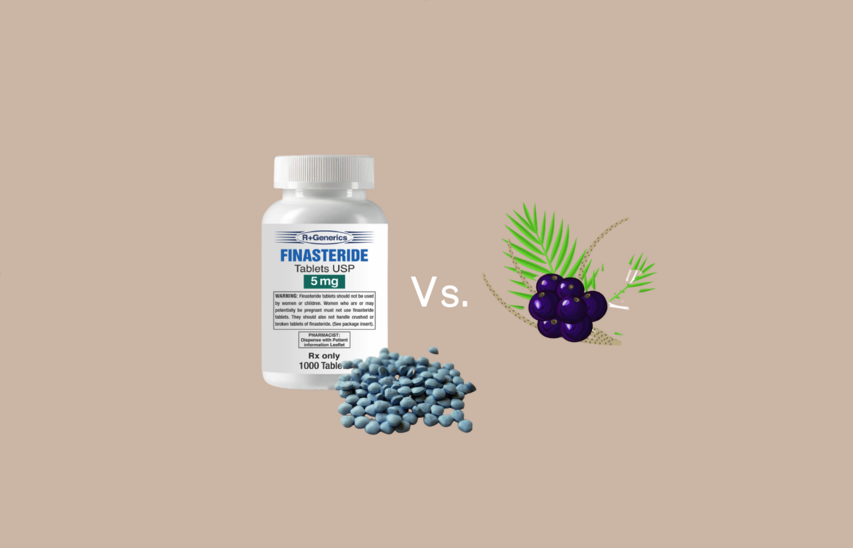Saw palmetto vs. Finasteride for hair loss treatment

Male pattern hair loss, aka androgenetic alopecia (AGA), affects a man's self-esteem. Saw palmetto and Finasteride are two popular treatments. Before deciding which one will be the best for you, it's essential to understand the differences between both medications before using them.
What is androgenetic alopecia (AGA)?
Before we dive into the specifics of saw palmetto and Finasteride, it's essential to understand what androgenetic alopecia is and how it affects the hair. Male pattern alopecia is a type of hair loss characterized by thinning hair on the crown of the head and receding hairlines. As a result, testosterone is converted into dihydrotestosterone, a hormone that leads to thinning hair and hair loss. Both women and men suffer from androgenetic alopecia, though it affects more men. The condition tends to occur in people with a family history of baldness. The disorder can potentially be reversed with medications that block the production of DHT.
What is saw palmetto?
Saw palmetto is a herbal supplement derived from the berries of the plant. It is believed to work by inhibiting the production of testosterone. It has been traditionally used to treat an enlarged prostate and may improve symptoms of sexual dysfunction. It may also have anti-inflammatory properties and may be effective as a support for treating bladder infections.
How does saw palmetto help with hair regrowth?
Saw palmetto blocks 5-alpha-reductase, the enzyme that converts testosterone to DHT, leading to less DHT in the body, potentially slowing hair loss and promoting new hair growth.
Several studies have indicated that using oral and topical products containing saw palmetto can lead to hair regrowth. In one study (Prager et al., 2002), 52% of participants experienced a decrease in hair shedding, 60% observed an improvement in hair quality, and 83.3% reported an increase in hair density. Another study (Rossi et al., 2012) compared the effectiveness of oral saw palmetto (serenoa repens) with Finasteride (Propecia) for male pattern hair loss. Results showed that hair regrowth occurred in 68% of men taking Finasteride and 38% using saw palmetto, the plant-based alternative. The authors concluded that saw palmetto could be considered a valid approach for treating low or moderate androgenetic male pattern alopecia and a good alternative for patients who cannot use Finasteride or other topical therapies.
Saw palmetto is available over the counter and is generally considered safe. When taken orally, it may cause some side effects, including stomach upset, nausea, and dizziness. As with all other supplements, if you take other medications or supplements, please consult your healthcare provider before taking saw palmetto.
What is Finasteride?
The prescription medication Finasteride (original brand name Propecia) is approved for treating male pattern baldness and prostate cancer. The drug inhibits the production of DHT, which is believed to contribute to both conditions. The prescription drug Finasteride comes in pill form and is taken once a day.
How does Finasteride help with hair regrowth?
Evidence shows that Finasteride can promote hair growth in men with androgenetic alopecia. In clinical studies, men who took Finasteride saw an increase in hair count and a decrease in hair loss. However, Finasteride may only work for some, and results may vary. It's essential to be patient and consistent to see the best results.
What are the most common side effects of Finasteride?
Some men who take Finasteride may experience sexual side effects such as decreased sex drive and impotence. These side effects may be reversible if the medication is stopped, but in some cases, they may persist even after treatment has been discontinued. Other potential side effects of Finasteride include breast tenderness and enlargement, rashes, and dizziness. Finasteride may also interact with certain medications, so you must inform your healthcare provider of all medications and supplements you are taking.
Which one is better: saw palmetto or Finasteride?
So, which is better for treating androgenetic alopecia: saw palmetto or Finasteride? The answer is not necessarily straightforward, as both medications have unique benefits and drawbacks. Saw palmetto is an over-the-counter supplement that may promote hair growth and have additional health benefits. However, the research on saw palmetto and hair loss is limited, and may cause side effects such as stomach upset and dizziness.
Takeaway:
Saw palmetto and Finasteride are two good options for treating androgenetic alopecia or male pattern baldness. Although both can promote hair growth, there are important differences between them. Saw palmetto is an over-the-counter supplement that may have additional health benefits. Finasteride is a medication that can be taken just by men, requires a prescription, and can be associated with some significant side effects.
Shop:
MDhair Regrowth Supplements with Saw Palmetto
More info:
How does saw palmetto benefit hair health?
Female pattern Hair loss - Best supplements
Best hair growth supplements for men
References:
- Zanzottera F, Bizzaro G, Michelotti A, Nobile V. Efficacy of a nutritional supplement, standardized in fatty acids and phytosterols, on hair loss and hair health in both women
and men. J Cosmo Trichol. 2017;3(121):2. - Prager, N., Bickett, K., French, N., & Marcovici, G. (2002). A randomized, double-blind, placebo-controlled trial to determine the effectiveness of botanically derived inhibitors of 5-alpha-reductase in the treatment of androgenetic alopecia. Journal of alternative and complementary medicine, 8(2), 143-152.
- Rossi, A., Mari, E., Scarno, M., Garelli, V., Maxia, C., & Scali, E. (2012). Comparative effectiveness of Finasteride vs. Serenoa repens in male androgenetic alopecia: a two-year study. International journal of immunopathology and pharmacology, 25(4), 1167-1173.
- Prager, N., & Marcovici, G. (2001). A pilot study to determine the effectiveness of botanically derived inhibitors of 5-alpha-reductase in the treatment of androgenetic alopecia. Journal of alternative and complementary medicine, 7(3), 213-218.
Find the most effective hair growth products for you by taking the free hair assessment.



